“War: not a necessary evil.”
by Stacie Lawrence
David Powell served two tours of duty in Vietnam from 1965 to 1967, one of the most senseless and dehumanizing wars in history. Americans don’t speak much of it because we pretend it didn’t happen. He states, “The following events come to my conscious memory uninvited. I not only remember them vividly, I re-experience them with all my senses:”
Froze with fright, standing up, the first time I was under fire
Watched two marines try to break open the skull of a dead Viet Cong with a large rock
Observed a marine intentionally shoot a girl four or six years of age
Watched the girl’s grandfather carry her into our line of fire, sobbing.(Powell)
Powell continues with horrific descriptions of his experiences, finding brain matter on a fence, seeing marines laugh as Viet Congs bleed to death, being abandoned, being shot, he was nearly trapped, and he was robbed. David watched a man shoot himself in the foot to get evacuated and heard the same man cry in his sleep when he was returned to the company. All this equates to vile and inhumane memories of one man’s experiences of one war as recounted in his selection titled Vietnam: What I remember.
What happens to people in war changes their whole being. They are affected by their experiences in a way that influences their sense of existence. These experiences become a part of their every day, every moment, every breath, for they have impacted them in a way that every moment, every thought, every feeling is shaped by what they saw, heard, did, feared, or prayed about. War is immoral, it is ultimately ineffective, and it is indecent. War is not a necessary evil.
NPR’s Morning Edition “Treatment of War Prisoners: When Does Law Apply?” posed the question of morality in war: what of their behavior is ethical, what crosses the line, and who makes those decisions? One caller suggested that many of the wars we have engaged in during this past century have really been found to be unnecessary. The caller indicated that the information we now have shows that our intentions in fighting were wrong. Look at Vietnam, a war that our society sees as a black mark on our history and yet we continue to engage in immoral acts of violence with no solid foundation, reason or purpose. Do we seriously consider the effects of wars on our society, families, and each individual? I think we do not. We engage ourselves more in the General Patton-like glamour and glory of fighting with honor, fighting for freedoms. Is there really freedom in seeing your friend’s face blown off, or sending home bodies of young fathers and sons, wives and daughters? Is there honor in knowing that you don’t have a choice whether or not to kill a child, or someone’s sister or father?
My grandfather, Cecil Hansen, served with a sense of honor in the United States Army Air Forces, stationed in Assam, India, with the Air Transport Command flying equipment and supplies, including bombs and gasoline to China. During his assignments he had many frightening experiences, flew cargo in hellish storms, had an engine catch on fire, and survived to be brought safely “home”. In his memoir A Hump Flight from Sookerating Assam, India to China,
Most hump pilots [pilots who transported cargo over the “hump” between India and China] flew their whole tour of Foreign Service duty without ever having walked down the narrow streets of a Chinese city. The whole operation there was geared to put supplies over the Hump which couldn’t be done with airplanes sitting on the ground in China. As soon as my ship was uploaded and we had eaten a bite, we were on our way “home.” Only once did I stay overnight and I would have preferred not to have had the experience. It was sad to see what the people now had to live in—bombed out buildings and streets littered with debris. (Hansen)
Back in India, he said, “I would try to get some sleep or perhaps go to work in the Navigation Briefing Office knowing that in a day or two, I would do it all over again. In a way it was hard work and Sundays and holidays were not days off. But there was a job to be done and I was there helping to get it done so that the World could be at peace once more.” He wrote of another flight in the chapter “Storm from Hell” when the fuel gages reached the empty mark, “I continued my silent prayer, until I felt the wheels touch down on the runway. Thirty-five air craft were ‘lost’ during that storm, and as I taxied to the parking area I was grateful to be home.” For a time, India was his “home”.
Left back in the United States my grandmother, Nina, a young bride had sent her husband, her future off, never really knowing where he was. She would be following his assignments but because the military was not as supportive as they are today of their soldiers families she would wander starving for a bite to eat, lonely, searching door to door to find a place to sleep. While working in a prisoner camp in New Mexico she was burned by a war prisoner with a cigar who thought she was a Jew. She was once told that her husband’s plane was missing and worried for hours just to be told that they were only seeing how she would handle the stress. She was threatened, and felt lost with her husband oversees and no money to call home, to eat, or place to sleep; only waiting. She would be awakened screaming from visions of planes crashing, thinking her life; her love, would never come “home.” Similar to my grandfather’s aircraft being out of fuel, spirits were empty as well. My grandmother wrote of a time, “My mind was ready to blow, nerves to burst, and my spirit was dead. I went to bed captured by an evil and frightening feeling of what this kind of world was,” a world of war. We don’t stop often enough to consider the ramifications to our people of engaging in acts of war? Our wars have damaged more than our soldiers, deficited more than our nation’s pockets.
Charles Frazier describes how men respond in returning from the carnage of war in his book Cold Mountain. Inman’s describes the deficit of his soul as “a spiritual journey of coming to terms with what he has done, with the innocence he has lost.” He further states “War took a man out of that circle of regular life and made a season of its own not much dependent on anything else.” Fire in the Hole by Dennis Tenety remembers, “I've seen bodies ripped to pieces by bullets, blown into millions of scraps by bombs, and pierced by booby traps. I’ve smelled the stench of bodies burned. I’ve heard the air sound like it was boiling from rounds flying back and forth. I’ve lived an insanity others should never live..." This is the carnage, the evil of war. The American Legion of Military Veterans now describes the effects of war as Post Traumatic Stress Disorder. During the Civil War it was “Soldier’s Heart,” World War I renamed it “Shell Shock,” World War II called it “Battle Fatigue.” The Korean War veterans were diagnosed with “War Neurosis,” and “Vietnam Syndrome” was the label for that generation; these effects certainly worth fighting for.
E. Housman’s poetry expresses the dishonor in not fighting, the idea of a coward’s funeral. The rhetoric used by Patten to convince soldiers to fight valiantly or be dishonored as Henry V indicated is appalling to me. Patriotic rhetoric used makes war seem inviting on film, we hear the words of courage and they build us up to want to fight, to have our share of the coveted honor, but if you had to watch your own child leave to fight a war that will someday be reflected upon as senseless would you send them to “Stand and fight and see your slain, And take the bullet in your brain” (Housman). Hell no! Do not suffer the idea of one man’s life to guard another. Use war money to build more prisons, cut off people’s arms for crimes, and hang people, but sending loved ones to die because we have allowed terror to become what it is is like a pissing match. Although Siegfried Sassoon [a man who served valiantly in World War I] did not protest the conduct of war, he did protest the political error and insincerity for which men and women are being sacrificed in his Statement Against the Continuation of the War. He said “I have seen and endured the sufferings of the troops, and I can no longer be a party to prolong these sufferings for ends which I believe to be evil and unjust.” As my grandfather said, “Soldiers fight wars, fight with honor, even wars that are not for the right reasons. Those in the military are there to do a job. They volunteer to go and serve, without questioning, so they can come home.” Soldiers fight for honor, for country. My grandmother said, “I lived through it, now I live with it.”
There is no “off the clock” time for soldiers or their families. What they have experienced becomes their full time job. The memories uninvited, the effects of their experiences are eternal. My grandparent’s experiences of war are part of every visit. Their innocence lost; they are removed from the very being they once were. They continue to be captured by evil and frightening feelings of what kind of world this is, a world with unnecessary wars. Charles Frazier says it best bidding farewell to fellow injured soldiers, “We’ll meet again in a better world.”
Thanksgiving 2025
-
Today is the day!
Thanksgiving!
I pulled it off, and am so grateful!
We had good food, I set the table, and even put on a lovely dress.
This morning, Jane,...
2 months ago










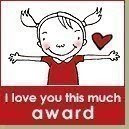

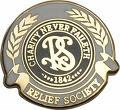
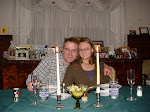

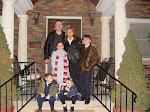





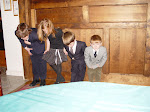

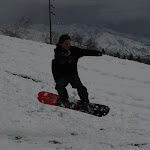
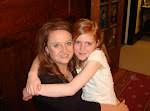


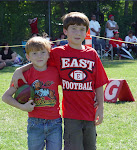
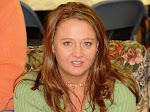













.jpg)















No comments:
Post a Comment